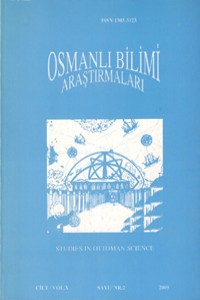Paul-Louis Simond and the inauguration of the Ottoman Institute of Bacteriology in Çemberlitaş, Istanbul (1911)
Öz
The Ottoman medical establishment showed an active interest in Louis
Pasteur‟s research. A team of specialists lead by Dr. A. Zoeros Tsalikis Pasha
visited his laboratory in Paris in 1886, after which a number of bacteriological
institutions and laboratories were founded in Turkey. Bilateral co-operation in
the sphere of microbiology continued, and the administration of the „Imperial
Institute of Bacteriology‟ (est. 1893) in Istanbul was entrusted to Dr. Maurice
Nicolle, and later to Dr. Paul Remlinger, both from the Pasteur Institute. The
renovated „Ottoman Institute of Bacteriology‟ at Çemberlitaş was inaugurated
on the 21st of September 1911, days before the opening of the Turco-Italian
war. Dr. Paul-Louis Simond, microbiologist and French navy physician, arrived
in Istanbul in October 1911 to assume the directorate of both the Imperial
Bacteriological and Rabies Institutes.
The Balkan Wars of 1912-1913 saw an explosion of cholera in Turkey,
and Dr. P.-L. Simond and his assistant Dr. Louis Pasteur Valléry-Radot were
able to study this epidemic in the field. The Ottoman Institute of Bacteriology
was operative not only in laboratory diagnosis, but also in the prophylactic and
treatment measures towards cholera, and in combating communicable diseases
endemic in the Empire. During the first Balkan War, Dr. Mehmet Kamil Berk
also conducted extensive research on the cholera patients under his care at the
Bezm-i alem Gureba Hospital in Istanbul. Dr. Berk collaborated with Drs.
Simond and Valléry-Radot in the publication of a final report on the epidemic.
Paul-Louis Simond‟s succesors at the Ottoman Institute were to be Turkish
bacteriologists, after his departure in the November of 1913.
Anahtar Kelimeler
Paul-Louis Simond Ottoman Bacteriological Institute Louis Pasteur Valléry-Radot Pasteur Institute Balkan Wars Mehmet Kamil Berk cholera
Kaynakça
- -
Öz
The Ottoman medical establishment showed an active interest in Louis Pasteur‟s research. A team of specialists lead by Dr. A. Zoeros Tsalikis Pasha visited his laboratory in Paris in 1886, after which a number of bacteriological institutions and laboratories were founded in Turkey. Bilateral co-operation in the sphere of microbiology continued, and the administration of the „Imperial Institute of Bacteriology‟ (est. 1893) in Istanbul was entrusted to Dr. Maurice Nicolle, and later to Dr. Paul Remlinger, both from the Pasteur Institute. The renovated „Ottoman Institute of Bacteriology‟ at Çemberlitaş was inaugurated on the 21st of September 1911, days before the opening of the Turco-Italian war. Dr. Paul-Louis Simond, microbiologist and French navy physician, arrived in Istanbul in October 1911 to assume the directorate of both the Imperial Bacteriological and Rabies Institutes.
The Balkan Wars of 1912-1913 saw an explosion of cholera in Turkey, and Dr. P.-L. Simond and his assistant Dr. Louis Pasteur Valléry-Radot were able to study this epidemic in the field. The Ottoman Institute of Bacteriology was operative not only in laboratory diagnosis, but also in the prophylactic and treatment measures towards cholera, and in combating communicable diseases endemic in the Empire. During the first Balkan War, Dr. Mehmet Kamil Berk also conducted extensive research on the cholera patients under his care at the Bezm-i alem Gureba Hospital in Istanbul. Dr. Berk collaborated with Drs. Simond and Valléry-Radot in the publication of a final report on the epidemic. Paul-Louis Simond‟s succesors at the Ottoman Institute were to be Turkish bacteriologists, after his departure in the November of 1913.
Anahtar Kelimeler
Paul-Louis Simond Bakteriyolojihane Louis Pasteur Valléry-Radot Pasteur Enstitüsü Balkan Savaşları Mehmet Kamil Berk kolera
Kaynakça
- -
Ayrıntılar
| Birincil Dil | Türkçe |
|---|---|
| Bölüm | Araştırma Makaleleri |
| Yazarlar | |
| Yayımlanma Tarihi | 1 Haziran 2009 |
| Yayımlandığı Sayı | Yıl 2009 Cilt: 10 Sayı: 2 |


